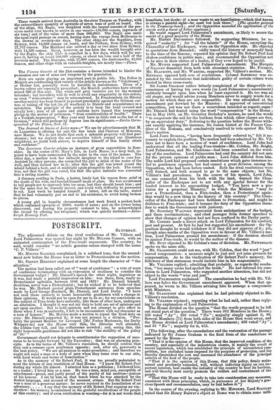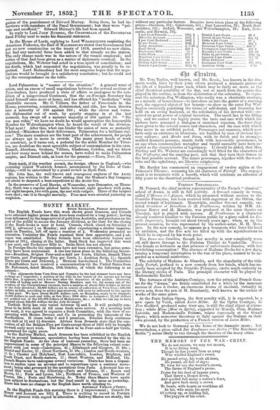POSTSCRIPT.
SkTMIDAY.
The adjourned debate on the rival resolutions of Mr. Villiers and Lord Palmerston was opened last night by Mr. MILNER GIBSON, with an animated continuation of the Free-trade arguments. The country, he said, would consider "no article genuine unless stamped with the name C. P. Villiers.' " Mr. MILNES GABICELL complained, in a subdued tone, that the amend- ment now before the House was as bitter to Protectionists as the motion.
Mr. SIDNEY HERBERT explained at some length the character of "the situation."
The motion had been called one of "want of confidence " : a vote of want of confidence terminating with an expression of readiness to consider the Government budget ! Mr. Disraeli's speech the other night, ingenious as it was, had made a painful impression on him.: was there then, really no Protectionist agitation between 1846 and 1852? Mr. Disraeli himself, doubtless, never was a Protectionist ; but he wished it to be believed that he was. Mr. Herbert quoted plain Protectionist sentences from speeches made by Lord George Bentinck, Mr. Disraeli, and Lord Derby. "I have not rend these extracts to taunt honourable gentlemen with a change in their opinions. It would not be open for me to do so ; for my convictions on the subject of Free-trade have naturally, like those of other men, undergone an alteration. I thought it was not my duty to hold one set of opinions and act upon another. But to hold opinions and not attempt to give effect to them when I was in authority, I felt to be inconsistent with my character as a man of honour." Mr. Herries made a motion to repeal the fixed duty on corn : Mr. Disraeli supported it; it was not pressed to a division. "Pro- bably the present Member for Liverpool [Mr. Forbes Mackenzie, the Derby Whipper-in] saw the House very thin, the libraries well attended, the lobbies very full, and the coffeerooms crowded ; and, seeing this, the right honourable gentleman did not like to risk the stability of the policy of '46.' " Government should not delegate to constituencies the suggestion of mea- sures to be brought forward by the Executive ; that was an alarming prin- ciple. As to the terms of Mr. Villiers's resolution, he should confess that they cast a censure upon gentlemen opposite ; and, after all, generosity is the best policy. "We are all anxious to make proselytes ; and therefore we ought not repel a man or a body of men when they come over to our side, with hard words and terms of humiliation."
As to the memory of Sir Robert Peel, it was too proudly pedestaled to need the tribute of any resolution of that House. "I knew Sir Robert Peel during my whole life almost. I admired him as a politician ; I followed him as a leader ; I loved him as a man. He was a man, mind you, susceptible of attachment—proud, and justly proud of the purity of his motives—jealous of his honour. I sat by him on that bench when he was attacked by the foulest language, and accused of the meanest crimes. ' But Sir Robert Peel -was a man of a generous nature : he never rejoiced in the humiliation of an
adversary I say that the memory of Sir Robert Peel requires no vin- dication : his memory is embalmed in the grateful recollections of the people of this country ; and if even retribution is wanting—for it is not words that
humiliate, but deeds—if a man wants to see humiliation—which God knows is always a painful sight—he need but look there." [The speaker pointed to the Treasury-bench; and the Opposition seconded the application of the words with a burst of bitter applause.] lie would support Lord Palmerston 's amendment, as likely to secure the assent of a great majority of the House.
Mr. HENRY Daummostn followed. In supporting Ministers, he re- quired " audacity" ; for " all the talents" of the House, excepting the Chancellor of the Exchequer, were on the Opposition side. He objected to quotations from Hansard ; oddly traced the history of monopoly back to the time of the Saxons ; repeated his opinion that Sir Robert Peel had shaken confidence in public men and recommended the Opposition not to be nice in their choice of a leader, if they ever hoped to be useful. Mr. Myers supported Lord Pallerston's amendment. The Marquis of GRANBY dissented from both with abundant statistics. Mr. Fiezno-e, Mr. BLACICEIT' and Mr. WARNER, supported Mr. Villiers's motion. Mr. KENDALL opposed both sets of resolutions. Colonel Suirtione was re- minded by the resolutions that individuals guilty of certain crimes were buried in three cross-roads.
Sir jAMES GRAHAM rather bitterly complained of the disagreeble cir- cumstance of having his own words [in Lord Palmerston's amendment] suddenly brought upon him when he least expected it. He too was an old stager, and would advise young Members never to supply words for a motion for which they are not responsible. He was astonished at the amendment put forward by the Ministry : it approved of unrestricted competition, yet was not there a reservation intended as regards sugar ? Mr. Disraeli had denied using the word "compensation" in the House - but in May 1850, on Mr. Grantley Berkeley's motion, he used the words "to to compensate the soil for the burdens from which other classes are free, by an equivalent duty." Referring to the question before the House with- out exactly applying the instance, Sir James hinted at the Faue.es Cau- dime of the Romans, and conclusively resolved to vote against Mr. Vil- liers's motion.
Lord Joins Russztr.,, "having been frequently referred to," felt it ne- cessary to explain the position. The motion had been admitted by Mr. Vil- liers not to have been a motion of want of confidence. Lord John bad understood that all the leading Free-traders—Mr. Cobden, Mr. Bright„ Lord Palmerston, and Mr. Gladstone—had been consulted on the word- ing of the resolution. Lord Palmerston had said the country did not care for the private opinions of public men : Lord John differed from him. The noble Lord had proposed certain resolutions which gave immense re- lief to gentlemen opposite, but had caused a great division among the Opposition, who had been before united.- . Both the rival resolutions were- well framed, and both seemed to go to the same objects but Mr.
Villiers's had precedence. In the courtie of his speech, ferd John, as one connected from his birth with the land, warned the Chan- cellor of the Exchequer not to act with any special favour for the landed interest in his approaching budget. "You have now a pro- vision for a perpetual Ministry," in which the Minister "may be now a Protectionist, then a Free-trader, then a Protectionist again: that would be a new thing in the history of this country." The Chan- cellor of the Exchequer had been faithless to Protection, and might be faithless to Free-trade ; and it became the duty of the Opposition there- fore to watch the Government with jealousy.
Mr. Secretary WALPOLE deprecated these anticipations of the budget, and these recriminations ; and cited passages from former speeches to show that changes of opinion had not been confined to the Derby party. Mr. COBDEN made a direct attack on Lord Palmerston for his conduct, past and present. At first he had but suggested his amendment : the Op-
position thought he would withdraw it if they did not approve of it ; yet, though nine-tenths of the Opposition were in favour of Mr. Villiers's mo- tion, Lord Palmerston pressed his amendment : if the decision should be against Free-trade, he would be the author of the disaster.
Mr. BLITT objected to MT Cobden's tone of-dictation. MT. NEWDEGATE spoke on the same side. Mr. Gransroste could not see, with Mr. Cobden, that the word "just" barred compensation : a measure might be just and yet raise grounds for compensation. As to the vindication of Sir Robert Peel's memory, the followers of that statesman would imitate him in his magnanimity.
Mr. Vrtaseas replied ; admitting that probably, as regards the resolu- tion, "too many cooks had spoiled the broth." He had referred his reso- lution to Lord Palmerston, who suggested another alteration, but did not object to the words "wise and just.'
Lord PALMERSTON explained. The consultation he had with Mr. Vil- liers was before the Government amendment appeared. When that ap- peared, he wrote to Mr. Villiers advising him to arrange a compromise with Ministers.
Mr. Gransroste also explained that he had privately objected to Mr. Villiers's resolution.
Mr. Vrtaxens rejoined ; repeating what he had said, rather than reply- ing to the explanation of Lord Palmerston. The House divided on the question "that the words proposed to be left out stand part of the question." There were 592 Members in the House ; 256 voted Ay" 336 voted " No" ; majority simply against it, 80. Several Members1) from both sides of the House then went away, and the House on Lord Palmeraton's amendment; 468 voted " Ay " and 53 "No " ; majority for it, 415.
[The following, after the emendations and the restoration of the passage indicated by Sir James Graham is the final form of the resolutions as passed by the House-
" That it is the opinion of this House, that the improved condition of the country, and especially of the industrious classes, is mainly the result of recent legislation, which has established the principle of unrestricted com- petition, has abolished taxes imposed for the purposes of protection, and has thereby diminished the cost and increased the abundance of the principal articles of the food of the people. "That it is the opinion of this House, that this policy, firmly main- tained and prudently extended, will, without inflicting injury on any im- portant interest, beat enable the industry of the country to bear its burdens, and will thereby most surely promote the welfare and contentment of the People. "That this House will be ready to take into consideration any measures, consistent with these principles, which, in pursuance of her Majesty's gra- cious Speech and recommendation, may be laid before it.")
In the course of the evening, replying to Mr. Hann= Lord STANLET stated that Sir Henry Bulwer's object at Rome was to obtain some mid- gation of the punishment of Edward Murray. Being there, he had in- terviews with members of the Papal Government ; but they were "pri- vate and unofficial." Edward Murray's life had been spared.
In reply to Lord. Jose; Itussers,, the Cnaeieseeen of the Emma:earns fixed Friday next to make his financial statement
In the House of Lords, replying to Lord WEGUINCIIPPE respecting the American Fisheries, the Earl of MALMESSURY stated that Government had put no new construction on the treaty of 1818, asserted no new claim, nor had any material force been added to that already on the station. The only change made was in the nature of the vessels employed ; and notice of that had been given as a matter of diplomatic courtesy. In the negotiations, Mr. Webster had acted in a true spirit of conciliation ; and his death, which had suspended the negotiations, was greatly to be re- gretted. Lord Mahnesbury had the most sanguine hopes that the nego- tiations would be brought to a satisfactory conclusion ; but he could not lay the correspondence on the table.



























 Previous page
Previous page